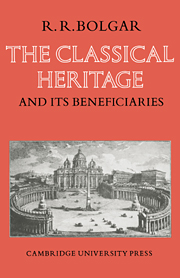Book contents
- Frontmatter
- Contents
- Preface to 1973 impression
- Introduction
- Chapter I The Background
- Chapter II The Greek East
- Chapter III The Carolingian Age
- Chapter IV The Pre-scholastic Age
- Chapter V The Scholastic Age
- Chapter VI Collapse and New Beginnings
- Chapter VII The High Renaissance
- Chapter VIII The End of the Renaissance and the Appearance of New Patterns in Classical Education and Scholarship
- Chapter IX Education and the Classical Heritage
- Notes
- Appendix I Greek MSS. in Italy during the Fifteenth Century
- Appendix II The Translations of Greek and Roman Classics before 1600
- Index
Chapter V - The Scholastic Age
Published online by Cambridge University Press: 29 January 2010
- Frontmatter
- Contents
- Preface to 1973 impression
- Introduction
- Chapter I The Background
- Chapter II The Greek East
- Chapter III The Carolingian Age
- Chapter IV The Pre-scholastic Age
- Chapter V The Scholastic Age
- Chapter VI Collapse and New Beginnings
- Chapter VII The High Renaissance
- Chapter VIII The End of the Renaissance and the Appearance of New Patterns in Classical Education and Scholarship
- Chapter IX Education and the Classical Heritage
- Notes
- Appendix I Greek MSS. in Italy during the Fifteenth Century
- Appendix II The Translations of Greek and Roman Classics before 1600
- Index
Summary
The organic character of cultural growth is an observable fact which recent research has done much to underline. Historians and anthropologists have shown from their different standpoints that the various fields of human activity are closely interrelated and dominated in every epoch by certain pervasive tendencies. In the Renaissance there is the spirit of individualism, in the Baroque Age the spirit of centralised order. The life of the Trobriand islanders described by Malinowski centres on the meticulous recognition of reciprocal duties, that of the North American Zuñi on a love of ceremoniousness. By the same token it is possible to note after the middle of the twelfth century the widespread workings of what one might fairly call a spirit of organisation. The object of this organising interest was the whole of human knowledge, but it concentrated more particularly upon that new information which had come to light as a result of the study of classical sources during the preceding two hundred years, and which was still to a great extent an alien element in the existing medieval system.
Various circumstances combined to produce the mental climate of this epoch, which we may perhaps call the Age of Scholasticism after the most eminent of its intellectual products. The essentials of ancient rhetoric, law, medicine, logic and natural philosophy had been laid bare. Further work along the lines followed by an Anselm of Bisate, an Irnerius, an Abélard, a Constantine or a Gundisalvi was not likely to produce memorable fruit.
- Type
- Chapter
- Information
- The Classical Heritage and its Beneficiaries , pp. 202 - 238Publisher: Cambridge University PressPrint publication year: 1973



